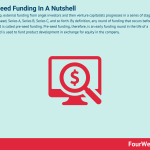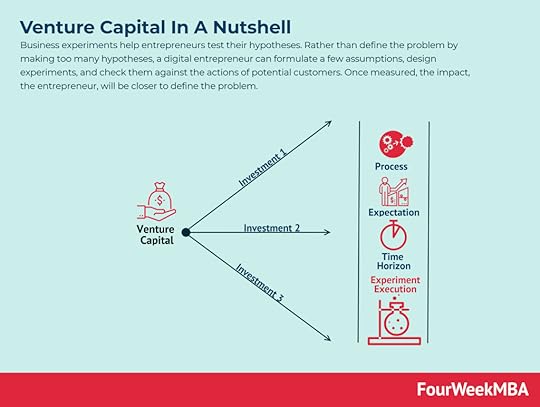What Is Pre-seed Funding? Pre-seed Funding In A Nutshell


In a startup, external funding from angel investors and then venture capitalists progresses in a series of stages including seed, Series A, Series B, Series C, and so forth. By definition, any round of funding that occurs before the seed round is called pre-seed funding. Pre-seed funding, therefore, is an early funding round in the life of a startup and is used to fund product development in exchange for equity in the company.
Understanding pre-seed fundingSince pre-seed funding is provided in the very early stages of a startup’s journey, the idea of acquiring it is to sustain the launch of the business and, ideally, take it to the next milestone.
Capital is normally provided by the founders themselves or by friends and family members and may range anywhere between $10,000 and $250,000. However, some startups also secure funding from angel investors, accelerator programs, incubator programs, and venture capital funds. Once the capital has been secured, entrepreneurs seek to make it last as long as possible.
Irrespective of the funding source, however, it is important the founders remain accountable to their investors at all times. In most cases, the pre-seed investment will last around 12 months or up to 18 months if there are unforeseen circumstances. Extensions beyond 18 months usually indicate that the startup has set goals that were too ambitious.
When should a startup raise pre-seed funding?While there are no concrete conditions for raising pre-seed funding, most startups will share some of the following characteristics:
A minimum viable product (MVP) has been developed and is displaying tentative signs of traction with users.Data or proof of product-market fit has been identified.There is a need or readiness to recruit critical additional staff.The presence of a capable founding team with relevant skills and expertise.Cash is required to build a prototype.The start-up has made its first revenue.How can a business attract pre-seed funding?Most startups will find the process of attracting pre-seed funding easier if they are already generating sales. However, for those that don’t have a working product, it can be helpful to consider the following pointers:
Secure an introduction – to connect with an investor who isn’t a friend or family member, entrepreneurs can connect with a potential investor by seeking an introduction from an individual they trust. For best results, this should be someone the investor has worked with in the past.Personality – investors want to see certain personality traits in the startup’s founders. These include a propensity for risk-taking and the passion and motivation to make their dreams a reality.Relevant qualifications – similarly, investors look for startups with a founder who is surrounded by a qualified team that complements their skillset. A solo entrepreneur with a background in accountancy, for example, will have trouble attracting pre-seed funding since they lack product development experience. First-time entrepreneurs can also bolster their resumes if they hold a relevant Bachelor’s degree or previously worked at a tech company.Detailed funding pitch – this is a chance for the entrepreneurs to tell the story of their startup and where they see it heading in the future. The pitch must detail the problem the company is solving and how it intends to solve it. It must also provide detail on the estimated market size, business model, competitive advantage, key milestones, and projected revenue and customer growth.Key takeaways:Pre-seed funding is an early funding round in the life of a startup. It is used to fund product development in exchange for equity in the company.Pre-seed investment lasts approximately 12 months or up to 18 months if there are unforeseen circumstances. Extensions beyond this timeframe usually indicate overly ambitious entrepreneurs.Pre-seed funding can be obtained by securing an introduction from an individual known to the investor and crafting a funding pitch that gives an overview of the company’s goals and visions. It is also important that entrepreneurs have the personality and relevant qualifications to drive the company forward.Main Free Guides:
Business ModelsBusiness CompetitionBusiness StrategyBusiness DevelopmentDigital Business ModelsDistribution ChannelsMarketing StrategyPlatform Business ModelsRevenue ModelsTech Business ModelsBlockchain Business Models FrameworkConnected ConceptsAngel Investing
Venture Capital A venture capitalist generally invests in companies and startups which are still in a stage where their business model needs to be proved viable, or they need resources to scale up. Thus, those companies present high risks, but the potential for exponential growth. Therefore, venture capitalists look for startups that can bring a high ROI and high valuation multiples.Economic Moat
A venture capitalist generally invests in companies and startups which are still in a stage where their business model needs to be proved viable, or they need resources to scale up. Thus, those companies present high risks, but the potential for exponential growth. Therefore, venture capitalists look for startups that can bring a high ROI and high valuation multiples.Economic Moat Economic or market moats represent the long-term business defensibility. Or how long a business can retain its competitive advantage in the marketplace over the years. Warren Buffet who popularized the term “moat” referred to it as a share of mind, opposite to market share, as such it is the characteristic that all valuable brands have.Meme Investing
Economic or market moats represent the long-term business defensibility. Or how long a business can retain its competitive advantage in the marketplace over the years. Warren Buffet who popularized the term “moat” referred to it as a share of mind, opposite to market share, as such it is the characteristic that all valuable brands have.Meme Investing Meme stocks are securities that go viral online and attract the attention of the younger generation of retail investors. Meme investing, therefore, is a bottom-up, community-driven approach to investing that positions itself as the antonym to Wall Street investing. Also, meme investing often looks at attractive opportunities with lower liquidity that might be easier to overtake, thus enabling wide speculation, as “meme investors” often look for disproportionate short-term returns.Payment for Order Flow
Meme stocks are securities that go viral online and attract the attention of the younger generation of retail investors. Meme investing, therefore, is a bottom-up, community-driven approach to investing that positions itself as the antonym to Wall Street investing. Also, meme investing often looks at attractive opportunities with lower liquidity that might be easier to overtake, thus enabling wide speculation, as “meme investors” often look for disproportionate short-term returns.Payment for Order Flow Payment for order flow consists of a “kickback” or commission that the broker routing customers to a market maker (in charge of enabling the bid and ask price) will pay a commission to the broker as a sort of market-making fee.What is a SPAC
Payment for order flow consists of a “kickback” or commission that the broker routing customers to a market maker (in charge of enabling the bid and ask price) will pay a commission to the broker as a sort of market-making fee.What is a SPAC A special purpose acquisition company (SPAC) is a company with no commercial operations that are created to raise capital through an IPO to acquire another company. The SPAC is also called for that reason a “blank check company” as it will use the money provided by investors to enable private companies to go public via the SPAC.
A special purpose acquisition company (SPAC) is a company with no commercial operations that are created to raise capital through an IPO to acquire another company. The SPAC is also called for that reason a “blank check company” as it will use the money provided by investors to enable private companies to go public via the SPAC.The post What Is Pre-seed Funding? Pre-seed Funding In A Nutshell appeared first on FourWeekMBA.



